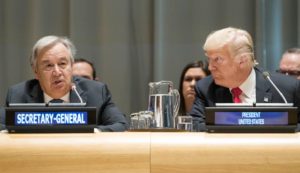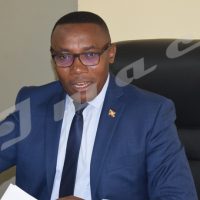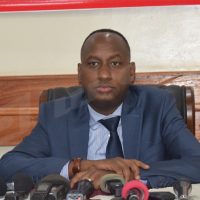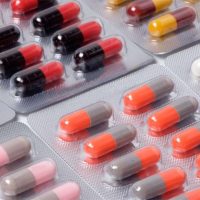On this Monday 24 September, a high-level event “Global Call to Action on the World Drug Problem” opened a high-level week of the 73rd session of the United Nations General Assembly.

The United States this morning convened a high-level event on countering narcotics, during which United States President Donald Trump presented his Global Call to Action on the World Drug Problem.
UN Photo/Mark Garten
Presided by the US president Donald J. Trump, U.S Permanent representative to the UN Ambassador Nikki Haley and the UN Secretary-General Antonio Guterres, the event calls all nations to take actions against drug, a global issue.129 countries at the United Nations have signed a U.S.-drafted pledge to join the U.S in the fight against the world drug problem.
Nikki Haley opened the session with a soft and articulated voice reminding attendants of the evils of drugs to their countries. “..it is a demand side issue and a supply side issue, drugs are corruption issue, a civil society issue. All of these issues are part of drugs problem and they don’t stop at geographic boarders”, said Nikki Haley U.S Permanent representative to the UN Ambassador.
President Donald J. Trump thanked the Secretary General for joining them as a special guest and showed his special consideration for the United Nations, “He’s become a great friend, and he’s doing a wonderful job at a very, very complex situation, but a beautiful situation” said President Trump adding, “And I’ve always said the United Nations has tremendous potential, and that potential is being met. Slowly but surely, it’s being met”.
Donald Trump alerts nations of the prevalence of drugs use that is exponentially mounting. He points out 60 percent raise of drugs related deaths in the world on the marge of 15 years. He ensured countries which signed the pledge that it is only by taking steps together that they can save countless lives.
“The call is simple: reduce drug demand; cut off the supply of illicit drugs; expand treatment; and strengthen international cooperation. If we take these steps together, we can save the lives of countless people in all corners of the world,” suggested the US President Donald J. Trump
The United Nations Secretary General Antonio Guterres suggested his way to remedy this global challenge that deepens some into poverty while benefiting others.
“To tackle this complex issue, we need strong action in two areas.First, by cracking down on drug trafficking and those who profit from human misery. That means denying safe haven to drug traffickers”, said the UN Secretary General Antonio Guterres.
Global strategies to fight global drugs problems: not a global priority
The United Nations Office on Drugs and Crime(UNODC) celebrated last year its 20th anniversary. The organisation has presented the world drug report of 2018 in five booklet formats. From the introduction of policy implications drawn from findings, overview on supply, production and consumption, these five booklets were designed to friendly inform readers about world drugs problems.
Though not listed on the recent report of the UNODC, the eastern region of Africa face tremendous effect related to drugs in all social sectors. The 2011 assessment shows an estimation of 1,736,000 heroin users in Africa with approximately 533,000 living in East Africa. Tanzania hosted almost half of these users.
In Burundi, drugs threats are not adequately taken seriously. Although there is a lack of credible number of drugs users and types from researches conducted by international organisations, drug business has so far attracted investors who enrich themselves at the expenses of victims’ misery.
In April 2018, Yaga, an online local platform consisted of young Burundian bloggers conducted a series of investigations into drug-uses. Their findings reveal a heinous effect of drugs in Burundian community. Drug use is a real fact that is unfortunately not effectively communicated. “Doctors told me that my son was not crazy but that he takes drugs, that he injects himself, I refused to believe it”, confessed a parent of one of a drug user to a Yaga blogger. Parents start to notice unusual behaviours on their children. Some of the parents fail to understand the causes and attribute them to the adolescent age crisis.
Yaga’s findings highlight serious health problems that shouldn’t be taken for granted. Commonly called Igikete or Umuzigo by faithful consumers and Boost by public, this mixture of heroin and other chemical substance wreak havoc in spreading HIV/AIDS according to the findings. injecting drug users surveyed in 2017, 10,2% were HIV-positive thus ten times the prevalence rate of the whole population (1,4%).
The government of Burundi is aware of the existence of boost and its dramatic effects on the population. OPC1 Polycarpe Ntakirutimana, the commander of the Anti-drug unit is informed about popular locations where boost is purchased. Dr. Jeanine Ayinkamiye, the deputy director of the anti-non-transmissible chronical diseases national program confirms the help provided to the reduction of drug dependency and depression. The Ministry of gender and social affairs advances the great contribution of his ministry to the victims of this scourge. He ensured that treatment and social reintegration is given to everybody and even those with no means but holding a certificate of indigence.
“The reality is that drugs and addiction are not abstract issues”, reminded Antonio Guterres, the UN SG during his speech at the high-level event “Counter-Narcotics”. It can be assumed, with less doubt that Burundi effort in fighting against drugs use is centred to the treatment. Victims are being assisted in any kind of ways according to Yaga investigations but few drug dealers have been apprehended and severely punished. Burundian government has not so far deployed necessary means to effectively eradicate this global challenge.
The UN Secretary General invited nations to cooperate, pursue kingpins and dismantle networks. “It means improved intelligence-sharing and analysis across the entire drug supply chain”, proposed Mr Antonio Guterres. If those strategies would be taken into consideration and well adopted, a lot of lives of youth in Burundi would be saved.



















 IWACU Open Data
IWACU Open Data

